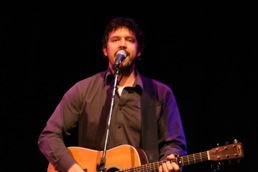Search
Rychard Carrington reports on Gus MacGregor, Martin Kaszak & Howard Roscoe, Cruel Folk – Cambridge Folk Club, 19 September 2008

Another slightly unlikely temporary residence for the Cambridge Folk Club this week: Romsey Labour Club looks like a splendidly old-fashioned and dignified working men's club. For better or worse, the Labour Party isn't too much in evidence: the pictures at the back of the stage are not of Keir Hardie and Aneurin Bevan (nor, thankfully, of Tony Blair and Gordon Brown) but of James Dean and Elvis Presley. Pool is played throughout, with the folk music something of an optional entertainment at one side of the large room. It's an arrangement that could have worked badly, but by closing time everyone seemed happy with the evening's entertainment.
Cruel Folk are a duo from Norfolk playing, principally, guitar and mandocello. As their name suggests, they specialise in dark ballads about adultery and hanging and general gruesomeness of yore. But their most popular song - rightfully so, I think - is thoroughly modern: The Worst Nightmare is narrated by a divorcee:
There's the one with the salad with the slug upon the top
The one where I'm crying and I just can't seem to stop
The one where I vote Tory, and you know that can't be true
But my worst nightmare is I'm married still to you
Eery though the trad tragedy tales are, I would like such wit to come to the fore a little more. There's potential for caustic contemporary observation which they could exploit. Caustic Folk?
I thoroughly enjoyed Martin Kaszak (vocals, various guitars) and Howard Roscoe (slide guitar, harmonica). It was a joy to see two very accomplished musicians, with such evident passion for their music, in full flow. Their set is steeped quite heavily, but not exclusively, in Americana. On My Space Martin lists his influences as Ralph McTell, Jim Croce, Blind Blake, Rory Gallagher, James Taylor and Steve Knightley (Blake, Knightley and Croce are each covered this evening, Croce twice in fact). The styles, then, are varied, but the overall feeling is one of bluesy resilience and unostentatious passion.
While Cruel Folk revel in the darkness, Gus MacGregor (pictured) provides some merciful light. Gus's music is inviting and soothing but powerful. While most singer-songwriter ballads sound dull and precious to me in their unoriginal sentiments and predictable style, Gus fully draws me into his thoughtful, humane world. The sounds and the feelings are delicate, but they are built with confidence and strength. Gus stands alongside the very best of the vintage Californian singer-songwriters (Jackson Browne, Joni Mitchell) whom he acknowledges as influences.
So many balladeers render themselves blander with soft-rock backing. Refreshingly, again, the only accompaniment to Gus's guitar is provided by a most able double-bass player named Philip Moll. Philip's contributions are judicious and lively, adding extra richness, energy and excitement to the musical texture, while not dissipating the intimacy and subtle intensity of the essential sparsity.
Gus's lyrics are honest, compassionate, evocative and refreshingly uncynical. The world he creates is benign gentle but unsoppy. Rather than revel in angst, he displays an inner contentment and optimism which allows him to encounter difficult feelings yet come through affirmatively, in a way that is heartening and inspiring. As he puts it:
It's okay, you and I will be fine,
We have been lost but we'll get there in time.
Dreams, like faded photographs and films,
Hold their charms, stay beautiful and still.
I am feeling we are driving home,
Somehow I know we are on the right road
Really, Gus MacGregor should be a very big star. That would help to make the world a better place.
Writer: Rychard Carrington